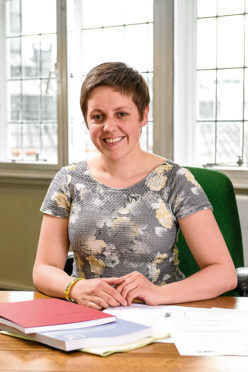New statistics suggest that more than a quarter of new mums in Scotland say they’ve been made to feel uncomfortable when breastfeeding in public.
This is despite the fact it has been illegal to prevent children under two from being breastfed in a public place for nearly 15 years.
The new stats come from the 2017 Scottish Maternal and Infant Nutrition Survey, which saw close to 8,000 new mums across the country take part.
In Grampian specifically the results fare slightly better, with three quarters of breastfeeding mothers having fed in public with only 13% of them saying they had been made to feel uncomfortable while doing so.
The research follows decades worth of advice given by health professionals, as well as a number of Scottish Government programmes aimed at encouraging breastfeeding.
The study itself is the only one of its kind to be carried out anywhere in the UK since 2010 and has provided insight into what modern mums are really going through as they navigate the path of raising a new born.
Yet its clear there is still more to be done.
Kirsty Blackman, MP for Aberdeen North, knows exactly how difficult it can be to juggle the work-life balance while breastfeeding.
“My son Harris was born in 2011 and two years later I had Rebecca in 2013,” she said.
“I breastfed both of them but it was not an easy journey.
“As modern women we are expected to breastfeed exclusively yet somehow be back to work in about six weeks.
“As a councillor I had no allocated maternity leave as quite simply there was no one to represent my constituents while I was off.
“After I had Harris I was back in the office within a month, it was an incredibly busy time.
“I breastfed in closed council meetings a few times and although I wasn’t made to feel uncomfortable as such it was a bit odd.
“It’s a very male dominated environment so I did think about it before I did it.
“There was also a reallocation of offices during that time and I was due to be placed in the middle of a big open-plan working space.
“I knew I wouldn’t feel particularly comfortable breastfeeding there so I specifically asked to be placed in a more private office for this reason.
“In the end it was easy to be moved, but I suppose I was lucky that it was an option.”
As a breastfeeding mum Kirsty said she felt constantly under scrutiny.
With health professionals, parenting books and so-called “mummy bloggers” all giving conflicting advice, it can be difficult to have confidence in how you choose to feed your new baby.
“It was incredibly hard with Harris,” said Kirsty.
“I had real difficulty breastfeeding and used a variety of methods with varying success.
“If anyone challenged me about feeding in public it was easy for me to say ‘hey – I’ve worked extremely hard to get to this point so back off!’
“But I can appreciate that for other women who don’t have a strong support network then any criticism can really knock your confidence about feeding while you’re out and about.”
Another contentious topic within the breastfeeding debate is how long breastfeeding should be encouraged for.
According to the new survey, Scottish mothers are breastfeeding for longer.
Overall it found that 43% of mums are continuing to breastfeed up to six months after birth, compared to 32% in 2010.
Of mothers who responded in the Grampian area, approximately half of mothers said they were still breastfeeding or expressing milk 8-12 months after work.
For Kirsty, this is positive news.
“Breastfeeding is not an easy experience for all mums, and many of us have really struggled to get going with it.
“For mothers to feed and express for as long as possible is great, and we can’t underestimate the effort it takes for a mum to feed for six months and longer.
“Education helps 100%, particularly in hospitals.
“There is also a great peer support network in Grampian which has been hugely positive.
“This includes various groups of normal women who are passionate about the benefits of breastfeeding.
“They are not nurses but have been approved by the NHS to be a part of the network and help women who are struggling with various aspects of breastfeeding.
“I experienced their help first hand and it was fantastic.”
However, despite the advances, the study also showed that inequalities continue to exist between different levels of society, with women living with deprivation the least likely to breastfeed.
Despite legal protection, 3% of mums surveyed also reported that they had been asked either not to breastfeed, or to stop breastfeeding, in a certain place.
